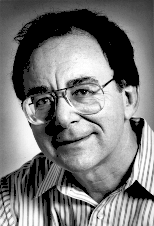

Computer Science and Engineering Professor Richard M. Karp, known for tackling seemingly insoluble problems, received a 1996 National Medal of Science, the nation's highest science honor, from President Bill Clinton on July 26.
Karp is the second UW faculty member to receive the award in as many years, following Physics Professor Hans Dehmelt's selection last year. Karp is one of eight 1996 medal winners who received their awards at a White House ceremony.
A major intellectual force in the development of theoretical computer science, Karp was awarded his medal for his work at the < A HREF="http://www.berkeley.edu/">University of California-Berkeley, where he was a professor. Karp joined the UW faculty in 1995 and has continued his leading work in linking advances of theoretical computer science to real-world problems. He is working with Leroy Hood, William Gates professor and chairman of the Department of Molecular Biotechnology, on deciphering the human genetic code.
"Dick Karp is one of the giants of computer science--a person who has literally changed the direction of the field," says Edward Lazowska, chair of computer science and engineering. "A pillar of Berkeley's outstanding department for many years, he moved to the UW in part because of the potential to help define the emerging field that lies at the interface of computer science and biology."
Karp, 61, received his Ph.D. in applied mathematics in 1959 from Harvard University. From 1959 to 1968, he was a research staff member at the IBM Watson Research Center. He joined the UC-Berkeley faculty in 1968.
In 1972, Karp gained international notice for demonstrating that a large class of challenging computational problems, arising from many different sources, are in fact disguised versions of a single underlying problem. This research earned him computer science's most prestigious honor, the Turing Award.
"This is the most significant award that I have received," Karp says of the medal. "The work that is being recognized by this award brought order to an important area of computation spanning domains ranging from pure mathematics to molecular biology. But there is still much to be done before we fully understand whether these problems can be tamed in practice."
Send a letter to the editor at columns@u.washington.edu.